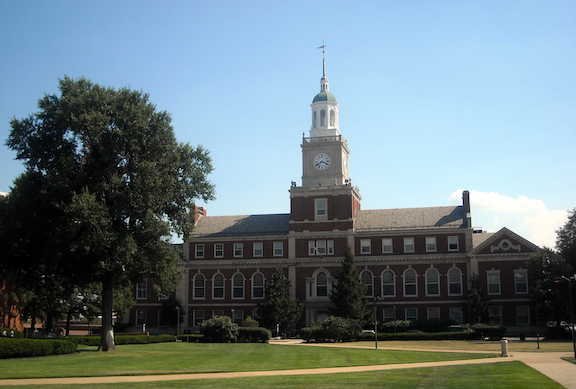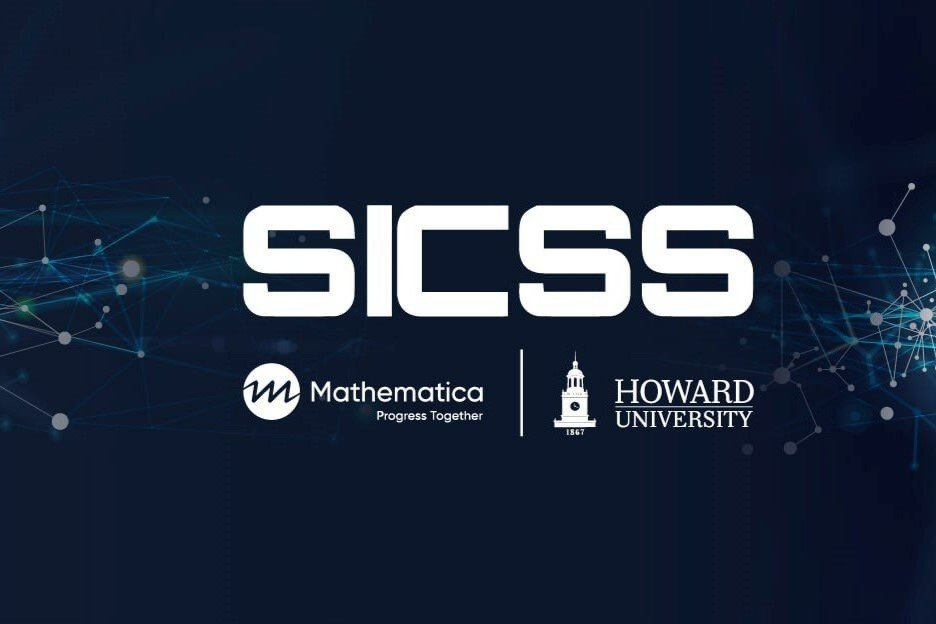Latanya Sweeney, Harvard Professor and Founder of the Public Interest Technology Lab, Delivers Keynote Address at SICSS-Howard/Mathematica 2023
Howard University
This blog is part of a 3-year ongoing series “The Future of Computational Social Science is Black” about SICSS-Howard/ Mathematica, the first Summer Institute in Computational Social Science held at a Historically Black College or University. To learn more about SICSS-H/M’s inaugural start, read the 2021 blog “Welcome SICSS-Howard/ Mathematica 2021” or our first blog “Uncovering new keys to countering anti-Black racism and inequity using computational social science.” If you are interested in applying to participate in SICSS-H/M 2024, check out our website.
Dr. Latanya Sweeney
Following in the well-established SICSS-Howard/Mathematica tradition of inviting an eminent black woman scholar to deliver the second week’s Keynote Address, this year’s address on July 26, 2023 was given by Dr. Latanya Sweeney - renowned professor, researcher, and pioneer in the fields of data privacy, algorithmic fairness, and public interest technology. Dr. Sweeney is the Daniel Paul Professor of the Practice of Government and Technology at the Harvard Kennedy School and in the Harvard Faculty of Arts and Sciences, director and founder of the Public Interest Tech Lab, Editor-in-Chief of Technology Science, and former Chief Technology Officer at the U.S. Federal Trade Commission. She studies technology science and the ways in which technology and society clash to impact humanity. How did she establish her career in this distinctive and relatively novel field?
During her talk, Dr. Sweeney reminisced on how her family supported her love of math from a young age. She surpassed all of the math offerings at her boarding school and was enrolled in courses at Wellesley College, where she took a computer programming class. This pivotal experience drove her towards a career in computer science, motivating her to enroll at MIT and eventually depart before finishing her degree to establish a computer company.
Dr. Sweeney ran her company for 10 years until the market crashed, but her journey didn’t end there. She envisioned technology’s potential to be “the great equalizer,” as an affordable, accessible, and bias-free tool for our democracy. Despite her remarkable achievements at the computer company, she noticed that as a black woman, her work was not being properly recognized. Understanding the importance of credentials for amplifying her voice, she completed her computer science undergraduate degree at Harvard and subsequently pursued her PhD at MIT. Sweeney continued to make strides in her field without the permission of the academic “boys’ club."
In a 2001 milestone marking one of many trailblazing achievements of her life, she became the first Black woman to graduate with her PhD in computer science from MIT. By her third year, she had already begun receiving offers for professorship positions, owing to the remarkable findings she derived from what would later be known as the Weld Experiment.
In this 1997 experiment, Sweeney conducted research that highlighted the vulnerability of confidential health data to re-identification. Despite the Health Insurance Portability and Accountability Act of 1996 (HIPAA), she successfully linked publicly available government records to the private medical records of Bill Weld, the Governor of Massachusetts at the time [1]. She eventually discovered that most of the U.S. population could be uniquely identified by their gender, zip code, and date of birth [2]. Dr. Sweeney recalls, “One day I’m a graduate student. About a month later, I'm testifying in DC… laws around the world changed because of that experiment.” This launched the start of her career in data privacy.
In addition to being explicitly cited in two U.S. regulations (including HIPAA) and four court decisions, Dr. Sweeney now has over 100 publications and three patents. What have been the keys to success in her professional journey?
Latanya humbly remarks that she’s had “an uncanny history of being first at a technology-society clash… doing a simple experiment to really highlight the problem and then getting a thousand great minds to follow.” Another major breakthrough occurred at the start of her Harvard professorship, when she demonstrated that upon Googling a name, advertisements appeared suggesting an associated arrest record 80% more frequently for names typically given to black children as compared to those given to white children - even in the absence of a real arrest record. Continuing her pattern of spurring legal and judicial transformation, Dr. Sweeney’s experiment resulted in the first instance of an algorithm, belonging to Google AdSense, being found in violation of the Civil Rights Act.
She and her students continued to study algorithmic fairness and data privacy during the 2016 elections. Their research uncovered the presence of inaccurate polling place data online, which disproportionately affected Black neighborhoods. They also demonstrated how easily a stranger’s online voter registration could be manipulated using their basic information. To counteract this vulnerability, her team developed voteflare.org, a free service that monitors the voter registration status of its users and notifies them of any alterations [3]. She again describes these revelations as the results of “simple experiments” which she could teach students how to replicate. These techniques, such as scraping and analyzing Twitter data, are essential to the computational social science skill set that SICSS participants build as a tool for discovery and transformation in various disciplines across the globe.
For Dr. Sweeney, the academy is the only place where she could pursue these endeavors with such freedom. However, she acknowledges that as the AI revolution progresses, academics may face challenges in conducting certain research due to restricted access to tools, data, and platforms owned by industry entities. She contemplates ways to liberate our data from these companies, and has initiated this paradigm shift through MyDataCan. This service offers affiliated apps that empower users to retain ownership and control over their personal data.
Dr. Sweeney also realizes that since she has started this work, the number of technology-society clashes has continued to increase dramatically. The very first clash, data privacy, still has not been resolved. Thus, what she first founded as the Data Privacy Lab at Carnegie Mellon in 2001 and brought to Harvard in 2011 has now expanded into Harvard’s Public Interest Technology Lab, the very first of its kind which “help(s) shape the future of technology and society to advance equity, expand opportunity and protect basic rights and liberties” [4]. As a leader in the field, Dr. Sweeney stresses the need to expand this work nationally, and names the Public Interest Technology University Network as a collaborative mechanism to spread the movement to other areas, including Howard University.
Committing to accountability in the service of public interest is a theme that echoes in one of Dr. Sweeney’s current projects. Via an anonymous drop online, she recently received over a thousand files that were eventually identified as the same documents leaked by Facebook whistleblower Frances Haugen in 2021. Sweeney’s team of nearly 100 students has taken up the task of making them searchable and accessible to the public. By referring to this SICSS-H/M keynote speech on the beta platform of fbarchive.org, readers can request early access to the documents before they are prepared for full public release.
Dr. Sweeney reflects, “in many ways, I think I am still that same graduate student who believes in the beauty and benefits of technology. But who’s trying to right these wrongs? What are these harms? Let’s expose them. Let’s solve them so that we can go on to that more perfect vision.”
We are deeply appreciative of Dr. Latanya Sweeney for sharing her expertise and the journey of her groundbreaking career with the SICSS-Howard/Mathematica 2023 cohort. Looking ahead, we eagerly anticipate the release of her new book In Technology We Trust, which will further detail her experiences in technology science and discuss how society can move forward. And move forward we will - Dr. Sweeney can rest assured that she has inspired SICSS-Howard/Mathematica participants to harness technological tools as a force for positive change in their communities and society as a whole.
For more information about SICSS-Howard/Mathematica, check out our website, follow us on Twitter, like us on Facebook, and join our email list. The application for SICSS-Howard/Mathematica 2024 is open! Apply now!
About the authors
Naniette H. Coleman is a PhD candidate in the Sociology Department at the University of California, Berkeley and the founder of SICSS-Howard/Mathematica. Her work sits at the intersection of the sociology of culture and organizations and focuses on cybersecurity, surveillance, and privacy in the US context. Specifically, Naniette’s research examines how organizations assess risk, make decisions, and respond to data breaches and organizational compliance with state, federal, and international privacy laws. Naniette holds a Master of Public Administration with a specialization in Democracy, Politics, and Institutions from the Harvard Kennedy School of Government, and both an M.A. in Economics and a B.A. in Communication from the University at Buffalo, SUNY. A non-traditional student, Naniette’s prior professional experience includes local, state, and federal service, as well as work for two international organizations, and two universities. Naniette is also passionate about the arts.
Amanda S. Lee received her Bachelor of Arts in Africana Studies and minor in Health & Society from Wellesley College. She served as a research assistant and the first lab manager for the AAC&U award-winning Interdisciplinary Research Group on Privacy/Coleman Research Lab. Amanda served as an event manager for SICSS-Howard/Mathematica 2021 and an event assistant in 2022. She currently works at a management consulting firm that uses data to help companies develop and execute strategic initiatives on business diversity and sustainability.







